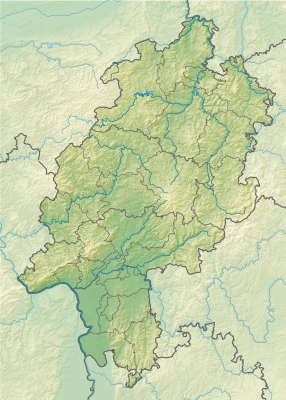Freudenberg Castle
| Freudenberg Castle | ||
|---|---|---|
| Creation time : | 1904 | |
| Conservation status: | under renovation | |
| Place: | Wiesbaden-Dotzheim | |
| Geographical location | 50 ° 3 '58 " N , 8 ° 10' 51" E | |
|
|
||
The Freudenberg Castle in the Hessian state capital Wiesbaden , district Dotzheim , has been a field of experience for developing the senses and thinking since 1993 .
history
Freudenberg Palace is not a palace in the true sense of the word, but was built in 1904 by the architect Paul Schultze-Naumburg as a representative villa in the middle of a park. The clients were the painter James Pitcairn-Knowles and Marie Eugénie Victoire Guérinet (1870–1959). The couple only lived in the palace for three years until 1908. After the First World War, it became an officers' mess for the French army and then a summer residence for the Wiesbaden Palace Hotel. Around 1920 the Essen district set up the "Taunusblick children's home" there, which was later taken over by the city of Essen and closed in 1931. Two years later the castle was used by the Gauamtsleitung of the NS-Frauenschaft Essen as a maternity home and belonged to the Lebensborn eV
In 1939 the castle was sold to the Wiesbaden Army Administration. After the end of the war, the United States 'armed forces operated an officers' mess for the nearby Camp Pieri barracks in the castle . In 1973 the US Army handed over the building, which was in extremely need of renovation, to the Federal Property Administration . The United Pentecostal Church used the building from 1977 to 1984 and operated a seminary, library, tea room and church room here. Then the castle stood empty and fell into disrepair. Destruction, vandalism and fire damage were the result.
In 1993, the Society of Nature & Art non-profit took over the castle and the park on the initiative of Matthias Schenk and Beatrice Dastis Schenk, together with a group of artists, craftsmen and educators. The first field of experience for the development of the senses and thinking was founded under the leitmotif of renovation = healing through art and culture .
Rehabilitation and field of experience
At the beginning of the building renovation in 1994, Emil Hädler, professor at the University of Applied Sciences in Mainz and an expert in the maintenance of old buildings, formulated the principle of renovation = healing through art . In the traditional renovation concept, building use is completely discontinued for the duration of the measures or only continued under difficult conditions. In Freudenberg Castle, on the other hand, use and renovation deliberately run in parallel: a constantly changing temporary arrangement is intended to open up new possibilities for perception. In the meantime, this method of designing the field of experience for the senses in a building and green space has become an impetus for further fields of experience across Europe and worldwide.
The development of artistic activities related to the field of experience for the development of the senses of Hugo Kükelhaus , which is equipped with 160 stations, instruments and tests for the models from this. It is a kind of “laboratory” in which anyone can experiment. You consciously embark on a journey of discovery of your own perceptual abilities with all your senses. This permanent exhibition is described by the founders of the association as a total work of art, in the sense of social sculpture by Joseph Beuys, and is self-financed through the entrance fees, conferences, seminars and cultural events that take place.
Vincenzo Baviera : The Standing Turner , 1994
Decommissioned bus from the Aktion Omnibus for Direct Democracy
Folklore in the garden
The Wiesbaden music festival Folklore , which took place for the first time in 1977 , was moved to the palace gardens in the 1990s and was called Folklore in the Garden . From 2007 it was moved to the grounds of the Schlachthof cultural center .
Web links
- Freudenberg Castle
- Field of experience for developing the senses
- Freudenberg Castle on the side of the city of Wiesbaden
- photoflug.de: Aerial view of the palace and park
Individual evidence
- ↑ schlossfreudenberg.de: History ( Memento from October 21, 2007 in the Internet Archive )










